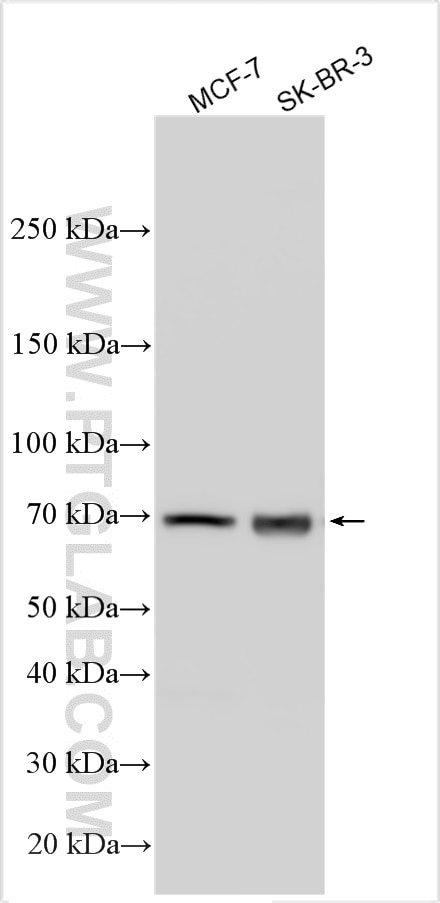Tested Applications
| Positive WB detected in | MCF-7 cells, SK-BR-3 cells |
Recommended dilution
| Application | Dilution |
|---|---|
| Western Blot (WB) | WB : 1:500-1:2000 |
| It is recommended that this reagent should be titrated in each testing system to obtain optimal results. | |
| Sample-dependent, Check data in validation data gallery. | |
Product Information
22860-1-AP targets ADAM33 in WB, ELISA applications and shows reactivity with human samples.
| Tested Reactivity | human |
| Host / Isotype | Rabbit / IgG |
| Class | Polyclonal |
| Type | Antibody |
| Immunogen | ADAM33 fusion protein Ag18852 Predict reactive species |
| Full Name | ADAM metallopeptidase domain 33 |
| Calculated Molecular Weight | 813 aa, 88 kDa |
| Observed Molecular Weight | 70 kDa |
| GenBank Accession Number | BC125113 |
| Gene Symbol | ADAM33 |
| Gene ID (NCBI) | 80332 |
| Conjugate | Unconjugated |
| Form | Liquid |
| Purification Method | Antigen affinity purification |
| UNIPROT ID | Q9BZ11 |
| Storage Buffer | PBS with 0.02% sodium azide and 50% glycerol , pH 7.3 |
| Storage Conditions | Store at -20°C. Stable for one year after shipment. Aliquoting is unnecessary for -20oC storage. 20ul sizes contain 0.1% BSA. |
Background Information
ADAM33 is a member of the 'a disintegrin and metalloprotease domain' family of proteins. Endogenous ADAM33 is detected in bronchus tissue, bronchial smooth muscle cells, and MRC-5 fibroblasts, consistent with a role in the pathophysiology of asthma(PMID:12535637). ADAM33 is a novel tumour suppressor gene that may be useful as a molecular marker for invasive lobular carcinoma of the breast(PMID:19267929)
Protocols
| Product Specific Protocols | |
|---|---|
| WB protocol for ADAM33 antibody 22860-1-AP | Download protocol |
| Standard Protocols | |
|---|---|
| Click here to view our Standard Protocols |



